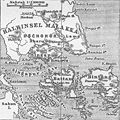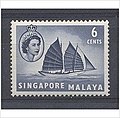Portal:Singapore
 Map of Singapore Singapore, officially the Republic of Singapore, is an island country and city-state in Southeast Asia. The country's territory comprises one main island, 63 satellite islands and islets, and one outlying islet. It is about one degree of latitude (137 kilometres or 85 miles) north of the equator, off the southern tip of the Malay Peninsula, bordering the Strait of Malacca to the west, the Singapore Strait to the south along with the Riau Islands in Indonesia, the South China Sea to the east, and the Straits of Johor along with the State of Johor in Malaysia to the north.
In its early history, Singapore was a maritime emporium known as Temasek and subsequently a major constituent part of several successive thalassocratic empires. Its contemporary era began in 1819, when Stamford Raffles established Singapore as an entrepôt trading post of the British Empire. In 1867, Singapore came under the direct control of Britain as part of the Straits Settlements. During World War II, Singapore was occupied by Japan in 1942 and returned to British control as a Crown colony following Japan's surrender in 1945. Singapore gained self-governance in 1959 and, in 1963, became part of the new federation of Malaysia, alongside Malaya, North Borneo, and Sarawak. Ideological differences led to Singapore's expulsion from the federation two years later; Singapore became an independent sovereign country in 1965. After early years of turbulence and despite lacking natural resources and a hinterland, the nation rapidly developed to become one of the Four Asian Tigers. As a highly developed country, it has one of the highest PPP-adjusted GDP per capita. It is also identified as a tax haven. Singapore is the only country in Asia with a AAA sovereign credit rating from all major rating agencies. It is a major aviation, financial, and maritime shipping hub and has consistently been ranked as one of the most expensive cities to live in for expatriates and foreign workers. Singapore ranks highly in key social indicators: education, healthcare, quality of life, personal safety, infrastructure, and housing, with a home-ownership rate of 88 percent. Singaporeans enjoy one of the longest life expectancies, fastest Internet connection speeds, lowest infant mortality rates, and lowest levels of corruption in the world. It has the third highest population density of any country, although there are numerous green and recreational spaces as a result of urban planning. With a multicultural population and in recognition of the cultural identities of the major ethnic groups within the nation, Singapore has four official languages: English, Malay, Mandarin, and Tamil. English is the common language, with exclusive use in numerous public services. Multi-racialism is enshrined in the constitution and continues to shape national policies. Singapore is a parliamentary republic and its legal system is based on common law. While the country is de jure a multi-party democracy with free elections, the government under the People's Action Party (PAP) wields widespread control and political dominance. One of the five founding members of ASEAN, Singapore is also the headquarters of the Asia-Pacific Economic Cooperation Secretariat, the Pacific Economic Cooperation Council Secretariat, and is the host city of many international conferences and events. Singapore is also a member of the United Nations, the World Trade Organization, the East Asia Summit, the Non-Aligned Movement, and the Commonwealth of Nations. (Full article...)Selected article -Pathlight School is a special school for children with autism in Singapore. Founded in 2004, it is run by the non-profit Autism Resource Centre and comprises one half of the national educational provision for autistic children. The school educates students in social and life skills, teaches them mainstream curriculum subjects and prepares them for employment in an autism friendly environment. (Full article...) Selected picture The baggage collection point of Changi Airport's Terminal 3. The green wall can be seen on the right. Read more... General imagesThe following are images from various Singapore-related articles on Wikipedia.
Selected biography -Reginald Hugh Hickling, CMG, QC (2 August 1920 – 11 February 2007), known as Hugh Hickling, was a British lawyer, civil servant, law academic, and author, and author of the controversial Internal Security Act of colonial Malaysia. Born in Derby, England, Hickling served from 1941 until 1946 in the British Royal Navy during World War II, and then joined the Colonial Legal Service. In 1955, Hickling was posted to Malaya (now Malaysia), where he gained prominence as a lawmaker. He drafted the Constitution of Malaysia, and as Commissioner of Law Revision wrote the Internal Security Act (ISA) of 1960, which provided for the detention of persons without trial. The ISA was later used to suppress political opponents or those dedicated to non-violent activities, which Hickling later said was not his intention. (Full article...) Did you know (auto-generated)
In this month
More did you know -
Selected panoramaThe National University of Singapore (Abbreviation: NUS; Chinese: 新加坡国立大学; pinyin: Xīnjiāpō Guólì Dàxué; Abbreviated 国大; Malay: Universiti Kebangsaan Singapura; Tamil: சிங்கப்பூர் தேசியப் பல்கலைக்கழகம் ) is Singapore's oldest university. It is the largest university in the country in terms of student enrollment and curriculum offered. Singapore topicsRelated portalsSoutheast Asia Other Countries Tasks
CategoriesWikiprojectsAssociated WikimediaThe following Wikimedia Foundation sister projects provide more on this subject:
Discover Wikipedia using portals |































































